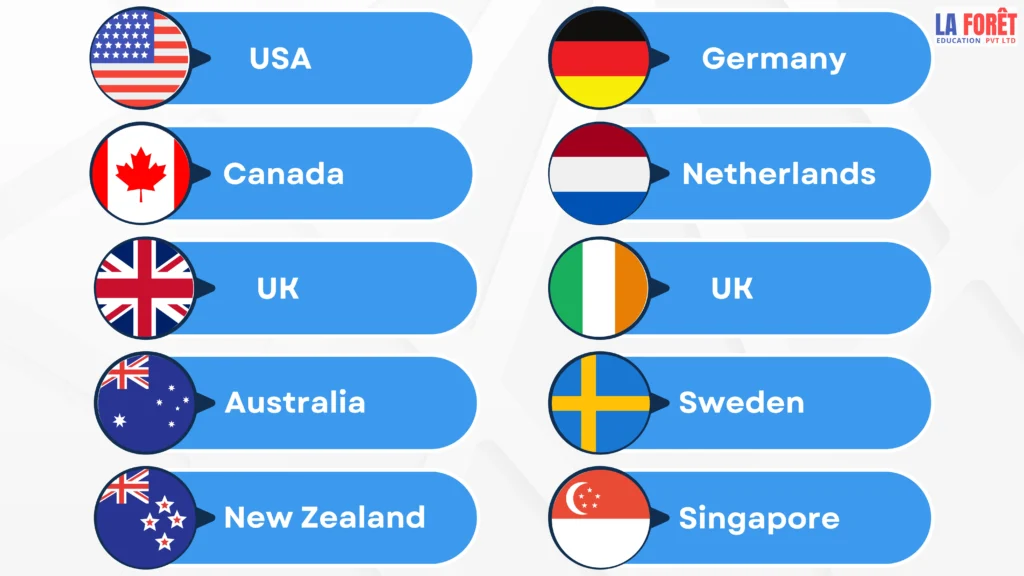In recent years, a global surge in demand for nurses has emerged due to healthcare expansion, an ageing population, and other factors. Nursing is a noble profession that offers global career opportunities, job security, and personal fulfillment. To achieve Sustainable Development Goal 3 by 2030, the WHO anticipates a need for an additional 9 million nurses and midwives worldwide.
But the cost of education in medical schools may take up all your savings. Therefore, it is essential to look for the best countries as it affects education quality, career prospects, and affordability. This article explores the top 10 countries to study nursing in 2026 and the best universities.
Top 10 Countries to Study Nursing for Indian Students

Are you a high school student or undergraduate in India, aspiring to a career in nursing but feeling overwhelmed by the multitude of choices? Selecting the right country for your nursing education is a step that shapes your future career. Each country offers distinct advantages. Let’s take a closer look at the top 10 countries that stand out in the realm of nursing education, each with its own unique strengths:
1. USA
USA is ranked #1 in the world for quality healthcare education. The USA is home to some of the world’s most renowned nursing programs generally spanning 4 years. It is celebrated for its advanced medical research, a broad spectrum of nursing fields, and cutting-edge healthcare facilities. Nursing degrees from American universities are highly valued worldwide, providing students with exceptional career prospects. Students gain hands-on clinical experience in advanced healthcare settings, making them industry-ready. According to the American Nurses Association, the demand for nurses in the USA is growing at a 9% annual rate. Here are some of the top universities for nursing in the USA.
Top Nursing Colleges:
- University of Pennsylvania
- Johns Hopkins University
- University of California, San Francisco
- University of Washington
- Yale University
- Duke University
2. Canada
Canada offers world-class nursing programs with affordable tuition, strong job prospects, and immigration-friendly policies. The country’s healthcare system ensures practical training, making graduates highly employable. Canadian universities focus on evidence-based practice, patient-centered care, and diverse nursing specialisations, including advanced roles like nurse practitioners and clinical nurse specialists. With a multicultural environment and universal healthcare, Canada attracts thousands of international nursing students every year. The demand for nurses is expected to more than double in the next decade, offering excellent career security. Here are some of the top universities in Canada for nursing education.
Top Nursing Colleges:
- University of Toronto
- McGill University
- University of British Columbia
- University of Alberta
- McMaster University
- University of Ottawa
3. UK
Students usually give first preference to the UK as it has a historical significance in nursing. The UK is globally recognised for its excellence in nursing education, offering diverse specialisations and extensive clinical placements within the National Health Service (NHS). The NHS is the publicly funded, one of the largest and most respected healthcare systems in the world. It plays a major role in the nursing profession as it employs a vast number of nurses, making it one of the largest employers of healthcare professionals in the world. International students can pursue careers in areas such as mental health, paediatrics, and research nursing. The UK also allows students to work 20 hours a week, helping them gain experience while managing expenses. Here are some of the top universities in the UK offering nursing programs.
Top Nursing Colleges:
- King’s College London
- University of Edinburgh
- University of Manchester
- University of Oxford
- University of Glasgow
- University of Southampton
4. Australia
Australian universities offer world-class nursing programs that blend theory and practical training. With courses lasting 3 to 4 years, students can specialise in various nursing fields while gaining real-world experience in diverse healthcare settings. Australia’s high employability rates for nurses and diverse clinical placements makes it an ideal choice for aspiring nurses. Its high quality of life, multicultural environment, and strong post-study work opportunities further enhance the learning experience. Below are the top universities offering nursing programs in Australia.
Top Nursing Colleges:
- University of Sydney
- Monash University
- University of Melbourne
- University of Queensland
- Griffith University
- University of South Australia
5. New Zealand
Nursing students benefit from a peaceful lifestyle, affordable tuition fees and numerous work opportunities in the country’s expanding healthcare sector. It offers high-quality nursing programs with a strong focus on cultural sensitivity and community health. Typically lasting three years, these programs prepare students for diverse healthcare roles. The country has a growing demand for nurses, especially in mental health and elderly care. Its flexible work shifts and competitive salaries further enhance career opportunities, making it an ideal destination for aspiring nurses. Below are the top universities offering nursing programs in New Zealand.
Top Nursing Colleges:
- University of Auckland
- Massey University
- University of Otago
- University of Canterbury
- Unitec Institute of Technology
- Victoria University of Wellington
6. Germany
Germany is a great option for nursing students due to its low-cost or tuition-free education at public universities. With a strong emphasis on practical training, modern medical facilities, and research-based learning, Germany ensures students are well-equipped for global careers. Germany provides both quality education and promising career opportunities in nursing. Known for its advanced medical technology and innovation, Germany attracts students seeking excellence in healthcare education. Many universities offer programs in English, welcoming international students from diverse backgrounds. Below are the top universities offering nursing programs in Germany.
Top Nursing Colleges:
- Charité – Universitätsmedizin Berlin
- Ludwig Maximilian University of Munich
- University of Heidelberg
- University of Hamburg
- RWTH Aachen University
- University of Freiburg
7. Netherlands
The Netherlands offers a forward-thinking approach to nursing education, emphasizing patient autonomy and community care. Universities focus on public health, medical sciences, and evidence-based nursing, preparing students for diverse healthcare roles. Ranked highly for post-study work opportunities, the Netherlands attracts international students seeking career stability in Europe’s healthcare sector. Its English-taught nursing programs, innovative teaching methods, advanced healthcare system and research-driven education create a well-rounded academic experience. Below are the top universities offering nursing programs in Netherlands.
Top Nursing Colleges:
- University of Groningen
- Maastricht University
- University of Amsterdam
- Erasmus University Rotterdam
- Utrecht University
- Avans University of Applied Sciences
8. Ireland
Ireland is an emerging hub for nursing education with excellent career prospects. Known for its well-developed healthcare sector and welcoming environment, Ireland offers competitive salaries for nurses. With over 13,000 vacancies in acute hospitals, demand for skilled healthcare professionals is rising. Ireland’s strong economy and government-sponsored healthcare system ensure high living standards, making it an attractive destination for aspiring nurses. Below are the top universities offering nursing programs in Ireland.
Top Nursing Colleges:
- Trinity College Dublin
- University College Dublin
- National University of Ireland
- Dublin City University
- National University of Ireland, Galway
- University College Cork
9. Sweden
Sweden is a leader in sustainable and patient-centered nursing education and research-driven healthcare. Nursing programs typically span three years and integrate innovative medical practices. With a strong focus on universal healthcare and medical research, Sweden dedicates 40% of its academic space to life sciences and 30% to medical education. International students benefit from a high standard of living and strong academic support. With rising demand for healthcare professionals, Sweden provides excellent career prospects in hospitals and clinics across the country. Below are the top universities offering nursing programs in Sweden.
Top Nursing Colleges:
- Karolinska Institute
- Linkoping University
- University of Gothenburg
- Lund University
- Stockholm University
- Uppsala University
10. Singapore
Singapore is one of Asia’s most affluent nations, thanks to its state-of-the-art healthcare technology and global partnerships. Nursing programs combine rigorous academic training with hands-on clinical experience. Early hospital exposure equips students with essential skills, preparing them for global healthcare careers. Below are the top universities offering nursing programs in Singapore.
Top Nursing Colleges:
- National University of Singapore
- Nanyang Polytechnic
- Singapore Institute of Technology
- James Cook University Singapore
- Duke-NUS Medical School
Undergraduate Courses to Study Nursing
Undergraduate nursing programs provide a strong foundation in healthcare, preparing students for diverse roles in the medical field. Popular programs include Bachelor of Science in Nursing (BSc Nursing) and Bachelor of Nursing (BNurs). On average, the duration of a BSc in Nursing overseas is 3-4 years, however, this varies by country. These programs cover anatomy, pharmacology, patient care, and clinical practice.
To enroll, students need high school qualifications in science subjects and must meet English proficiency requirements such as IELTS or TOEFL. Upon graduation, they can work as registered nurses (RNs), pediatric nurses, or critical care specialists in hospitals, clinics, and community health settings. With increasing demand for healthcare professionals, nursing graduates enjoy strong job prospects and opportunities for specialization.
Postgraduate Courses to Study Nursing
Postgraduate nursing courses offer advanced training in specialized areas like midwifery, pediatric nursing, mental health nursing, and oncology nursing. These programs typically last 1 to 2 years and are designed for professionals with a Bachelor’s degree in Nursing or equivalent qualifications.
Postgraduate studies help nurses gain expertise in clinical leadership, healthcare management, and research, opening doors to senior positions such as nurse practitioners, clinical specialists, and healthcare administrators. One can also pursue jobs such as paramedic, physician associate, hospital CFO, pharmaceutical product manager etc. Many universities offer flexible study options, including full-time, part-time, and online programs, allowing working professionals to enhance their qualifications while continuing their careers.
Diploma & Certificate Courses to Study Nursing
For students looking for short-term, skill-focused programs, nursing diploma and certificate courses are ideal. These programs, lasting 6 months to 1 year, provide specialized training in geriatric care, emergency nursing, and critical care. They are cost-effective and serve as a quick entry into the healthcare industry or an add-on to full-time nursing degrees.
With lower tuition costs and flexible schedules, diploma and certificate courses are accessible options for career advancement. Many students use these programs to gain practical experience before pursuing full-time nursing degrees, while others use them to specialize in high-demand fields and improve job prospects.
Conclusion
Nurses, the backbone of healthcare, play a crucial role in hospitals, clinics, and communities worldwide. By choosing to study nursing abroad, you not only gain access to exceptional education but also open doors to diverse global career prospects. And remember, nurses are in demand anywhere in the world, so your choices are vast and promising. But to study at top nursing universities worldwide you need to crack your for IELTS, TOEFL, CELPIP, or PTE first. Start your journey today!
Frequently Asked Questions
1. Which Country is Best for Studying Nursing for Indian Students?
Ans: Choosing the best country for nursing studies depends on factors like education quality, job opportunities, affordability, and ease of visa processes. Popular destinations for Indian students include Canada, Australia, the UK, Ireland, and New Zealand. These countries offer globally recognised nursing degrees, excellent clinical training, and strong job prospects after graduation. Canada and Australia, in particular, have high demand for nurses, making it easier for graduates to secure permanent residency.
2. Which Country Has the Best Scope for Nursing?
Ans: Countries facing a nursing shortage provide excellent career opportunities for nursing graduates. Canada, the UK, the USA, and Australia are among the top choices due to high salaries, career growth, and demand for healthcare professionals. Canada, for instance, offers various immigration pathways for nurses, while the UK provides fast-track visa options. Additionally, Germany and Scandinavian countries have growing opportunities for skilled nurses with attractive benefits.
3. Which Is the Cheapest Country to Study Nursing?
Ans: For budget-conscious students, Germany, Norway, and Sweden offer affordable nursing programs, with low or no tuition fees at public universities. However, students may need to learn the local language for better integration. Countries like the Philippines, India, and Malaysia also provide cost-effective nursing education with quality training, making them ideal for students looking for a more affordable path.
4. Is It Required to Ace a Language Proficiency Test for Nursing Courses Abroad?
Ans: Yes, most universities require proof of English proficiency through tests like IELTS, TOEFL, OET, PTE, or CELPIP. The required score varies depending on the country and university. For example, nursing programs in Canada, Australia, and the UK typically require IELTS 6.5 to 7.0. Some countries, like Germany or Sweden, may also require proficiency in their native language if working in local hospitals. Strong language skills ensure better patient communication and higher employability.





